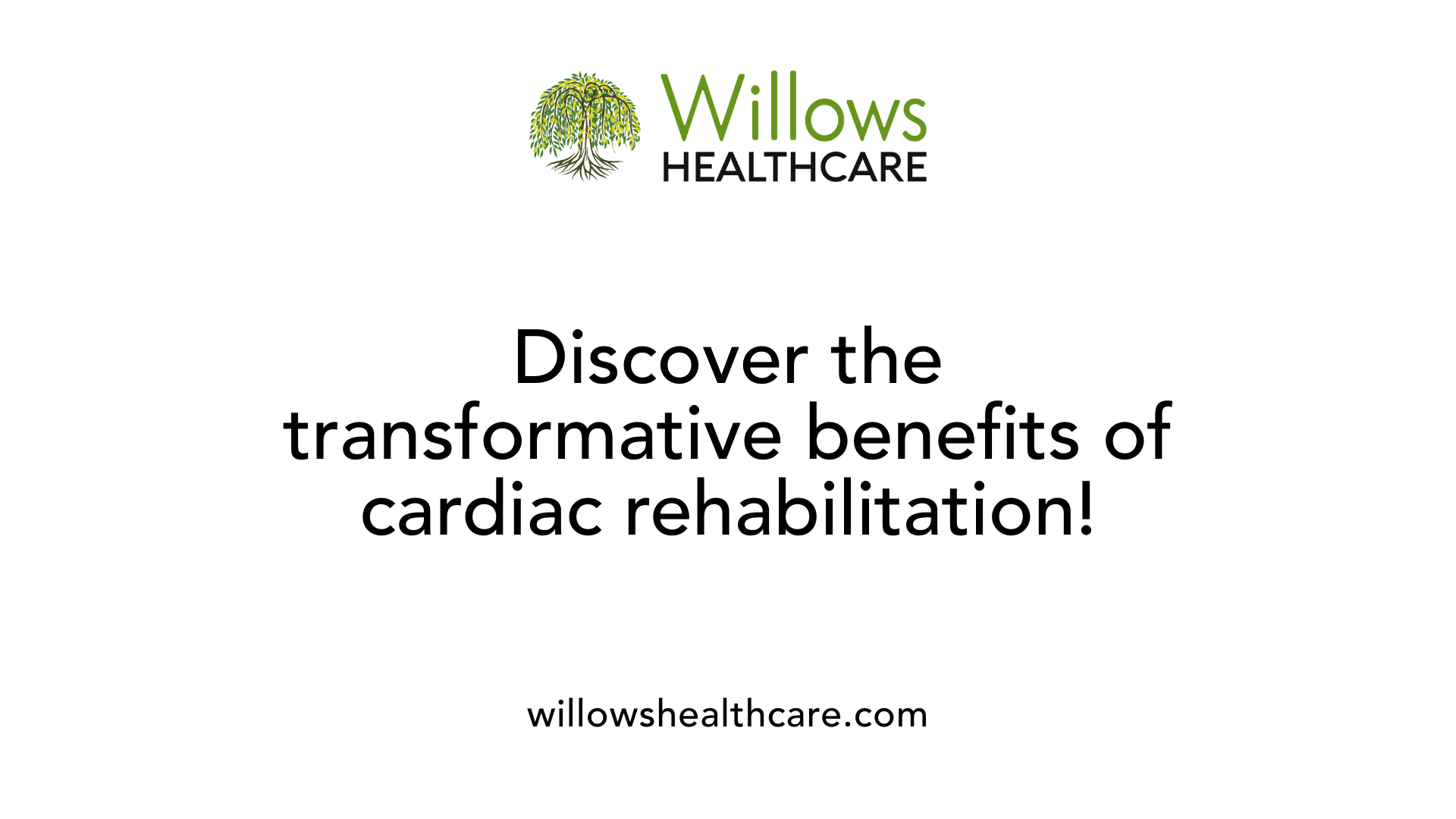The Benefits of Short-Term Rehabilitation for Cardiac Patients
April 1, 2025
Unlocking Health: The Power of Cardiac Rehab for Short-Term Recovery


Introduction to Cardiac Rehabilitation
Cardiac rehabilitation (CR) is an essential part of recovery for patients with heart disease. This medically supervised program not only aids in healing after cardiac events such as heart attacks or heart surgeries but also equips individuals with tools and education to maintain a heart-healthy lifestyle long-term. Emphasizing exercise, nutrition, and education, CR programs significantly enhance recovery outcomes and help prevent future cardiac issues. For patients looking to improve their quality of life and reduce their risk of further heart complications, short-term cardiac rehabilitation offers a structured and supportive approach.
Unravelling the Benefits of Cardiac Rehabilitation

What are the benefits of cardiac rehabilitation?
Cardiac rehabilitation offers numerous benefits for individuals recovering from heart problems, such as heart attacks and heart failure. It not only aids recovery but also helps prevent future heart issues by promoting a heart-healthy lifestyle. The program includes supervised physical activity, education on healthy eating, medication adherence, smoking cessation support, and mental health counseling.
Participation in cardiac rehabilitation has been shown to reduce the risk of death by approximately 35% within five years after a heart attack or bypass surgery. Research indicates that cardiac rehab can boost energy levels, improve mood, and enhance overall quality of life.
Improved recovery and heart health
The structured approach of cardiac rehabilitation focuses on crucial aspects like exercise training, which enhances heart function and promotes cardiovascular endurance. Regular participation significantly lessens hospital readmission rates and increases the chances of long-term survival.
Prevention of future heart issues
Individuals engaging in cardiac rehabilitation programs experience lower risks of subsequent heart attacks and cardiovascular-related deaths. Studies indicate a 58% reduction in cardiovascular death and a 30% decrease in heart attack risk, fostering a proactive approach to heart health.
Quality of life enhancement
Furthermore, patients who complete these programs report substantial improvements in their quality of life, characterized by increased stamina, better emotional well-being, and enhanced social support. This holistic care model is geared toward empowering individuals with the knowledge and resources necessary for long-term health maintenance.
Core Components of a Cardiac Rehabilitation Program

What are the key components of a cardiac rehabilitation program?
Cardiac rehabilitation is a multifaceted program aimed at aiding patients recovering from cardiovascular events. Its core components include:
- Exercise Training: Structured physical activity designed to enhance cardiovascular fitness and endurance.
- Cardiac Risk Factor Modification: Interventions targeting unhealthy behaviors such as poor diet, smoking, and inactivity to mitigate risks associated with heart disease.
- Heart Health Education: Information sessions covering topics like medication adherence, managing heart conditions, and benefits of maintaining a healthy lifestyle.
- Diet and Nutrition Counseling: Personalized plans promoting heart-healthy eating habits to manage weight and blood pressure effectively.
- Emotional Support: Psychological interventions to address post-event stress and anxiety, helping patients improve their overall mental well-being.
What are the phases of the program?
Cardiac rehabilitation is structured into three distinct phases:
| Phase | Description | Focus |
|---|---|---|
| Phase 1 | Inpatient | Initial recovery and medical supervision with light physical activity. |
| Phase 2 | Outpatient | Supervised exercise sessions and education, lasts up to 12 weeks. |
| Phase 3 | Independent | Self-directed exercise with ongoing lifestyle support. |
How is a tailored healthcare approach implemented?
Each cardiac rehab program is customized to meet individual patient needs. This tailored approach includes:
- Personalized Exercise Plans: Adjustments based on medical history, fitness level, and recovery goals, reducing anxiety associated with physical activities post-heart event.
- Interdisciplinary Care Team: Collaboration among specialists—such as cardiologists, dietitians, and psychologists—ensures comprehensive care and support throughout recovery.
This combination of structured physical activity, educational support, and psychological health management makes cardiac rehabilitation an effective strategy for improving patients' long-term health outcomes and quality of life.
Maximizing Recovery with Short-Term Cardiac Rehabilitation

What are the benefits of short-term cardiac rehabilitation?
Short-term cardiac rehabilitation offers numerous benefits that can significantly enhance recovery after a cardiac event. It expedites recovery by providing a structured program that includes supervised exercise, education, and counseling, which can improve physical fitness and overall heart health.
Participants receive personalized care from a dedicated team, ensuring that the rehabilitation is tailored to individual medical and therapeutic needs. This individualized approach helps patients feel more secure and supported throughout their recovery process.
Additionally, these programs often focus on promoting proper nutrition and healthy lifestyle changes, which can lead to long-term heart health. Notably, short-term rehabilitation can also alleviate symptoms like chest pain and improve emotional well-being by reducing stress and anxiety.
Overall, short-term rehabilitation can help individuals regain confidence and improve their quality of life after heart-related issues.
Structure and support provided
The structure of short-term cardiac rehabilitation typically consists of an intensive, supervised program that begins inpatient and may transition to outpatient care. This includes:
- Exercise Training: Supervised physical activity tailored to enhance cardiovascular fitness.
- Educational Workshops: Information on heart-healthy living and lifestyle modifications.
- Psychosocial Support: Counseling to manage emotional challenges related to recovery.
Together, these elements foster a comprehensive approach that addresses physical needs and emotional well-being.
Improvement of physical fitness and heart health
Research indicates that short-term rehabilitation leads to measurable improvements in patients' physical fitness. Notable enhancements include:
- Increased aerobic capacity and strength.
- Improved lipid profiles and blood pressure.
- Enhanced overall functional abilities, which contribute to better daily functioning.
In addition to these physiological benefits, participants typically report feeling more energetic and capable of engaging in daily activities. Regular exercise during rehabilitation is associated with reduced future cardiac risk, making this phase a critical step toward long-term heart health.
Cardiac Rehab Phases: From Hospital to Home

What are the four phases of cardiac rehabilitation?
The four phases of cardiac rehabilitation typically include the following:
- Acute Phase: This phase occurs in the hospital soon after a cardiac event, focusing on regaining mobility and safe exercise while assessing the patient's condition.
- Subacute Phase: Lasting from three to six weeks post-hospitalization, this outpatient phase emphasizes further education on exercise and self-monitoring techniques to manage heart health.
- Intensive Outpatient Therapy: In this phase, patients work towards independence, learning to monitor their physical responses and engaging in tailored exercises to improve strength, flexibility, and aerobic conditioning.
- Independent Ongoing Conditioning: The final phase focuses on maintaining long-term health through independent exercise routines, with strategies for self-management and support from healthcare professionals when needed.
Throughout these phases, the goal is to progress from medically supervised care in a hospital setting to an independent, self-managed approach to physical health and heart disease management. This structured progression allows individuals to gradually take charge of their recovery and maintain improvements in their cardiovascular health.
Evaluating the Value of Cardiac Rehabilitation

Advantages versus disadvantages
Cardiac rehabilitation presents numerous advantages that make it a cornerstone of recovery for patients with heart issues. Participants benefit from structured exercise plans, nutritional counseling, and emotional support tailored to their needs. While there might be concerns about the time commitment or resources required, the gains often surpass any potential downsides.
Impact on life expectancy and heart health
Engagement in cardiac rehabilitation can add an average of five years to a person's life expectancy. It substantially lowers the risk of subsequent heart attacks and strokes by as much as 58% in terms of cardiovascular death risk. This evidence highlights its effectiveness in stabilizing heart health and preventing further complications.
Holistic health improvements
Beyond just physical health, cardiac rehabilitation emphasizes psychological and social well-being. Patients report improvements in mood and a decrease in symptoms of anxiety and depression related to their heart conditions. This holistic approach not only fosters physical recovery but also enhances the emotional and social aspects of life, contributing to an overall better quality of life after major cardiac events.
Conclusion: Transforming Recovery with Cardiac Rehab
Cardiac rehabilitation serves as a cornerstone in the recovery journey for heart patients. Through a combination of structured exercise, education, and counseling, these programs not only facilitate healing after cardiac events but also empower individuals to live healthier, more fulfilled lives. Despite some barriers to participation, the profound benefits of CR, including enhanced quality of life and reduced risk of future heart issues, underscore its invaluable role in heart care. Whether hospital-based or completed independently, cardiac rehab is a transformative experience that ensures heart patients receive the comprehensive support they need to thrive beyond recovery.
References
- Cardiac Rehabilitation - StatPearls - NCBI Bookshelf
- Cardiac Rehab: Phases & Exercises To Help Your Heart
- How Cardiac Rehabilitation Can Help Heal Your Heart - CDC
- The Beneficial Effects of Cardiac Rehabilitation - PMC
- Cardiac rehabilitation - Mayo Clinic
- Benefits of Cardiac Rehabilitation - Doylestown Health
- How Inpatient Rehabilitation can Benefit Cardiac Conditions
- Importance of Cardiac Rehab for Patients - CHRISTUS Health
- The Benefits of Cardiac Rehab | University Hospitals
- How Inpatient Cardiac Rehabilitation Benefits Patients
Latest Blog

March 5, 2025
Heart Healthy Exercises For Seniors
Enhancing Cardiovascular Wellness Among Older Adults

March 5, 2025
Benefits Of Yoga For Seniors
Exploring the Life-Enhancing Power of Yoga for Older Adults































.jpeg)










































































































































































































.avif)






















































.jpeg)

































































.jpeg)














.jpg)









































.jpeg)












































































.avif)




.avif)

















































.avif)








































.avif)





























































































































